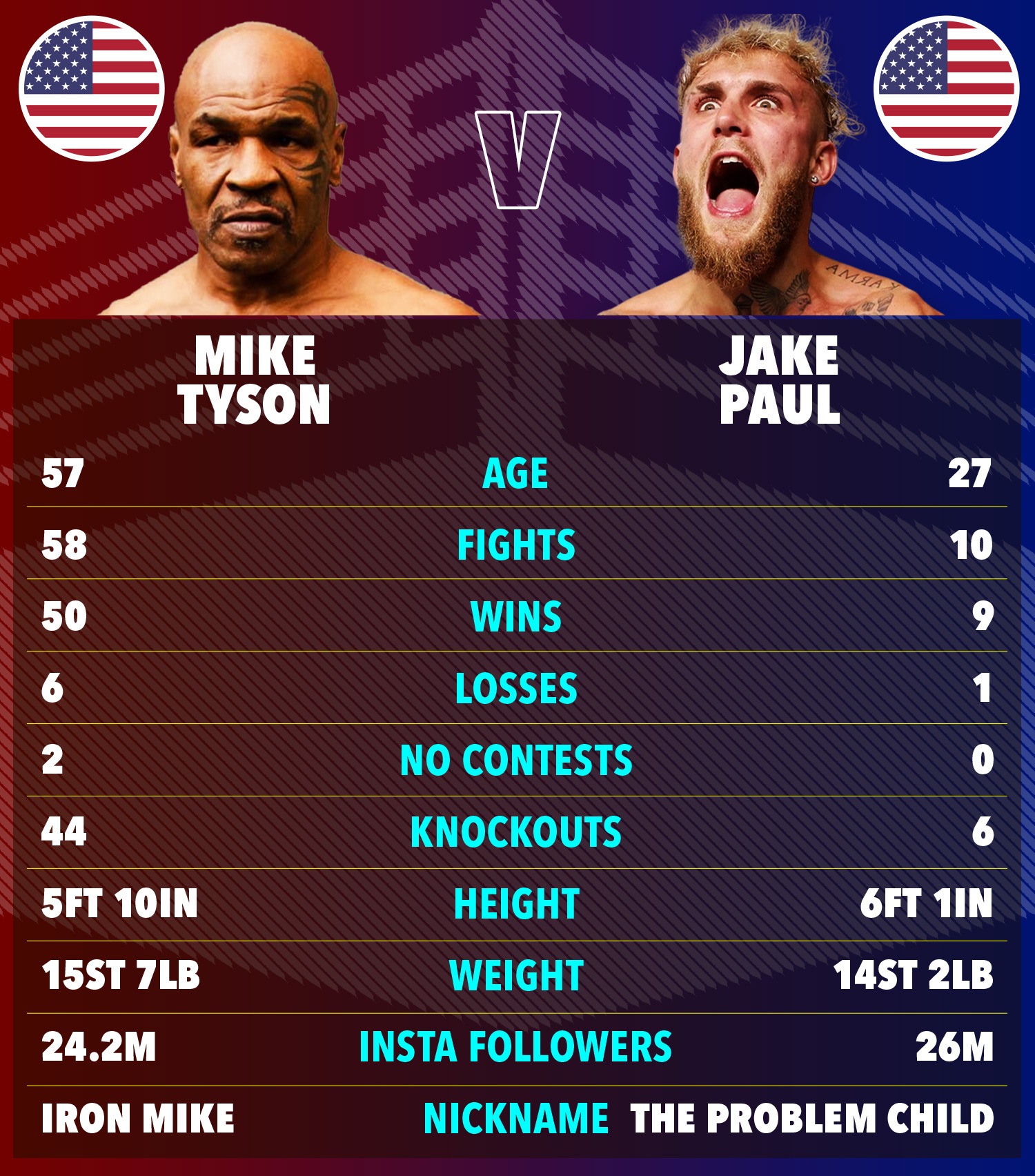Rumours Squashed
Jake Paul and Mike Tyson are set to clash in Texas on July 20, but they will not be wearing headguards during the fight.
Exact details about the rules and regulations, such as the number of rounds and professional sanctioning, have not been released yet.
Baseless Claims Put to Rest
British heavyweight Derek Chisora made wild claims that the fighters would wear headguards and use huge 18oz gloves, but Paul's business partner, Nakisa Bidarian, confirmed that this is not true.
Bidarian took to Instagram to clarify, stating, "Unequivocally there is no headgear for Paul vs. Tyson."

Fight Details
Mike Tyson came out of retirement in 2020 for an exhibition bout against Roy Jones Jr. and will now face Jake Paul in the upcoming match. Paul, with a record of 9-1, looks to challenge the boxing legend.
This fight marks Netflix's entry into live boxing and has garnered attention for the significant 30-year age gap between the two fighters.
Frequently Asked Questions
Can anyone learn professional boxing?
While boxing is accessible to many, not everyone will have what it takes to compete at a professional level. Professional boxing demands a unique combination of talent as well as physical abilities, mental strength and dedication. Prospective boxers also need to be willing to accept the inherent risks associated with the sport. A thorough examination by a trainer is a good way to determine whether or not someone has potential for a boxing career.
What is the best equipment for a beginner in professional boxing to start with?
If you are just starting out in professional boxing, essential equipment for beginners includes boxing gloves and hand wraps. Also, a mouthguard is necessary, as well as headgear, proper footwear, and a mouthguard. The use of a heavy, speed, or double-end bag is essential for technical workouts. It is essential to use equipment that provides protection and durability. Otherwise, you may increase your risk of injury.
How does one progress from amateur to professional boxing?
In order to transition from amateur boxing into professional, there is a major increase in the intensity of competitions, training and mental prep. An amateur must demonstrate a high level of performance by taking part in local or national competitions. To be able to secure professional bouts, it is important to have a professional license in boxing and align yourself with experienced managers or trainers.
How important is mental strength in professional boxing?
In professional boxing, mental toughness is just as important as physical fitness. It requires resilience, focus, a high level of pressure tolerance, and a strong psychological attitude to overcome obstacles. Mental training involves visualizing, learning stress management skills, and developing the right mindset to take on the challenges inside the ring. Without mental toughness, a boxer may struggle to perform optimally under the intense conditions of professional competition.
What role does a manager or promoter play in the career of a professional boxer?
Promoters and managers have a major role to play in a fighter’s professional life. Managers are responsible for guiding the boxer’s career path, negotiating contracts, and handling the business affairs of the boxer. They also provide support in selecting the right fights and looking after the boxer’s interests. Promoters are more focused on marketing, event organization and attracting sponsorship attention. They also focus on enhancing a boxer’s profile.
What are the key components of a boxer’s training routine?
A boxer’s regular training routine usually consists of multiple key components. These include technical skill development, tactical drills, strength and conditioning, sparring, and mental preparation. While tactical drills are used to develop fighting strategies and improve defensive moves, technique-focused workouts focus on improving punch accuracy. Sparring allows for practical combat experience. Conditioning exercises boost athleticism. Mental training emphasizes confidence, focus, and resilience.
How long does it take to become an elite boxer?
The time needed to become a professional fighter can vary greatly. The length of time to become a professional can be affected by the person’s initial skill level, his or her ability to adapt and their training. It could take a few years of hard work and success as an amateur before a person is ready to become a professional. Some people may develop more quickly while others will take more time.
Statistics
- Around 60% of professional boxers supplement their income with other activities or jobs, due to variability in fight earnings.
- Less than 10% of professional boxers are undefeated throughout their career, highlighting the sport’s competitive nature.
- Approximately 80% of professional boxers start their career in the amateur ranks before transitioning to the professional level.
- The average age for boxers to turn professional is between 18 to 25 years, though many continue to compete well into their 30s and beyond.
- Research shows that a boxer’s reaction time is typically under 0.25 seconds, honed through repetitive drills and sparring.
- Reports suggest that successful professional boxers can earn upwards of 50 times more than the median purse for entry-level professionals per fight.
- An analysis of boxing injuries suggests that 90% involve the head, neck, and face, emphasizing the importance of protective gear.
External Links
expertboxing.com
boxingscene.com
boxingnewsonline.net
wbcboxing.com
ringtv.com
usaboxing.org
sweetsciencefitness.com
How To
How to Master the Different Boxing Punches
A professional career in boxing requires that you master many different punches. Focus on fundamental punches like the jab and hook. Each punch requires different body mechanics. Concentrate on precision and technique rather than force. Use a heavy bag to practice combinations and improve power, and a speed bag to enhance your timing and hand-eye coordination. A shadowboxing session that focuses on punch precision is beneficial. Seeking feedback from your coach will help you progress.

